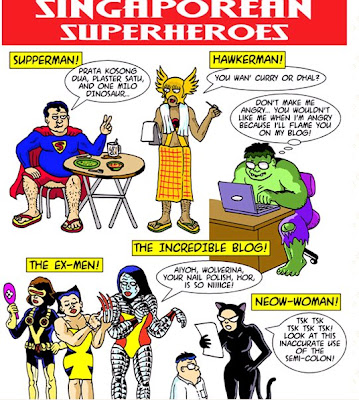

-credits to www.talkingcock.com
Geert Hofstede defines culture as the "collective programming of the mind which distinguishes the members of one group or category of people from another..includes systems of values and values are among the building blocks of culture".
This made me think about Singapore's culture? What is it exactly? Do we even have a culture? Many people have the misconception that Singapore does not have a bona fide culture ironically, due to our culture diversity.
I beg to differ. I feel that owing to the fact that Singapore is a cosmopolitan society where people of different races live harmoniously and interaction among different races is high, our culture is, as the Singapore Tourism Board has painstakingly been promoting- unique! It is not the "leeching" off of other countries with rich cultures as some people perceive it to be, but the fusion of the cultures of various ethnic groups such as the Chinese, Malay, Indian and Eurasian races, and making it our very own.
As reflected by the comic, we have come up with our own language- Singlish! Our own colloquial/creole language(a stable language that originates seemingly as a nativized pidgin) fundamentally English due to the British colonialization, but now loaded with substantial influences from the languages of the various ethnic groups. Interestingly, a book- The Coxford Singlish Dictionary as well as website has been created and dedicated to celebrate our culture as well as to aid non Singaporeans in understanding us better, as well as to increase effective communication between Singaporeans and the world(tourists for instance).
Similarly, thanks to our multi-racial society, we have the privillage of having and being exposed to all kinds of different cuisines and foreign delicacies that have been "localised" and invented new "fusion food" to call our own. For instance, from the above comic strip, "Supperman" the Chinese superhero is shown ordering roti prata- a local favourite created by the fusion of local Malay and Indian culinary skills.
"Rojak" is another food that Singaporeans have come up with that i feel represents us. It is a fruit and vegetable salad dish. The term "Rojak" is Malay for mixture, and also used as a colloquial expression for an eclectic mix, and in particular is often used to describe the multi-ethnic characteristics of our Singaporean society.
A sub culture prevalent in Singapore is our tendency to be "kiasu" or the fear of losing out to others. This word is often used in describing our social attitudes, our constant fear in losing out in our highly competitive society- the pressure of having to do well not only in exams but other non-academic achievements as well, in order to compete in our increasingly competitive and stressful society. Growing up with this mindset and belief that if they do not be "kiasu" brought on by teachers, parents as well as society in general, causing these students to become ambitious businesspeople, with the desire to be on top in terms of wealth and prestige, regardless of whether the most prestigious careers are aligned with what they really want.
Another pervasive Singaporean phenomenon, is the use of tissue packets to "chope" or reserve seats in food courts or hawker centres. This use of an artefact to "mark one's territory" is a social cue that Singaporeans (not all) have adopted to ensure that they have a space to sit and eat due to lack of space at crowded eateries. Even though I understand this logic behind the "choping" of seats, I still find it kinda weird at times and wonder if this kind of culture should be encouraged.

Imagine you are a tourist happily walking into a food court to try some local fare and you see this strange scene.
You then shrug it off and take a seat, thinking that Singapore is such a clean, well equipped place that free tissue paper is provided even at public food courts...until some auntie returns with a tray of food, gives you a killer look, points at the packets of tissue and chases you away.
Talk about culture shock.


No too long ago, the Singapore Discovery Centre introduced these interestingly designed tissue paper packets as tribute to this local phenomena.
I don't know if I should laugh or shake my head.
Should we really reinforce this kind of culture?
